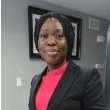
Ayomiposi G. Oluwadebi
Work place: Department of Geological Sciences, Osun State University, Nigeria
E-mail: ayofyfo@gmail.com
Website:
Research Interests: Earth & Environmental Sciences, Earth Sciences
Biography
Dr. Ayomiposi Grace Oluwadebi is a Geoscientist with over 9 years of academic experience in teaching and research. She holds a Doctorate degree in Petroleum Geosciences from the University of Manchester, a master’s degree from the University of Twente, the Netherlands in Geo-information Sciences and Earth Observation and a bachelor’s degree in Geology from the University of Ilorin. She is a Lecturer at the Geological Sciences Department, Osun State University, Nigeria and served as a part-time Teaching Assistant at the University of Manchester, United Kingdom. Dr Grace Oluwadebi have scientific publications and has co-authored articles in high impact journals. Grace is interested in interdisciplinary research such as the COVID-19 research and currently a part of the research team studying Gender-Based Violence in Primary Schools in Nigeria. She is a member of several professional bodies such as the Association of American Petroleum Geologist (AAPG), European Association of Geoscientists and Engineers (EAGE), Association of Women Geoscientist (AWG), Graduate Women International (GWI) among others
Author Articles
The Impact of COVID-19 on the Academic Performance of Students: A Psychosocial Study Using Association and Regression Model
By Aderonke B. Sakpere Ayomiposi G. Oluwadebi Oluwatoyin H. Ajilore Lauretta E. Malaka
DOI: https://doi.org/10.5815/ijeme.2021.05.04, Pub. Date: 8 Oct. 2021
The novel coronavirus (COVID-19) has affected every sector of human activities. The outbreak has not only resulted in the risk of death from infection but has greatly affected the education system globally. While universities around the world have adapted to academic changes because of this pandemic, some other universities such as in Nigeria seem to be far behind. Therefore, this study aims to understand the impact of COVID-19 on students in higher institutions in Nigeria. The study utilizes an interactive survey design to get responses from 1533 respondents who are students of tertiary institutions. Two sampling techniques, namely snow-balling and purposive, are used to administer the questionnaire. The participants are representative samples from across the 6 geo-political zones of Nigeria. The results from the descriptive analysis reveals that 11.6% of the respondents have been able to continue school online and 41.4% have a level of doubt about the ability of their school can adapt to the learning mode occurring globally. Inferential analysis was carried out to understand the association and regression between variables. Results from Chi-Square Test of association show that students from public universities are economically more affected than those from private universities (P-value < .005). The ordinal logistic model considered multiple independent variables. Results from the logistic model showed that the future effect of COVID-19 on career/academic progression of students hold, irrespective of discipline or degree of study or university category or level/year of study. Furthermore, 30% of the students, regardless of their discipline, degree of study, or university category expressed extreme or moderate hopelessness about their academic future concerning the pandemic.
The study has shown that the pandemic did not only lead to physical, technological, and economical challenges to education for Nigerian students, but also psychosocial challenges (such as hopelessness and high level of distrust for the existing educational systems) that may affect the way student engage and commit to their education in the post-pandemic world. This provides educational stakeholders including policy makers the adequate data needed to understand how exactly students have been affected and supportive measure to implement as tertiary institutions reopen for learning.
Other Articles
Subscribe to receive issue release notifications and newsletters from MECS Press journals